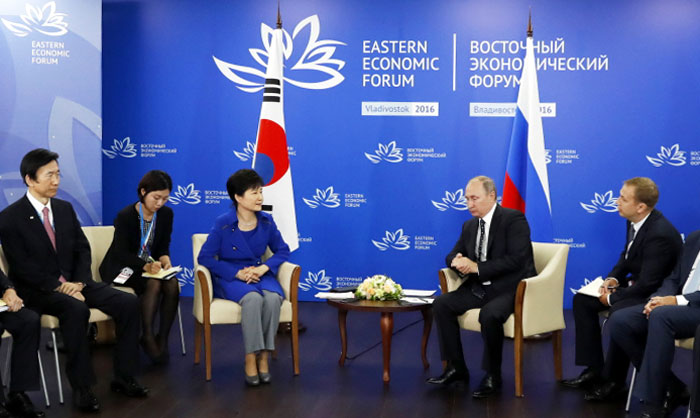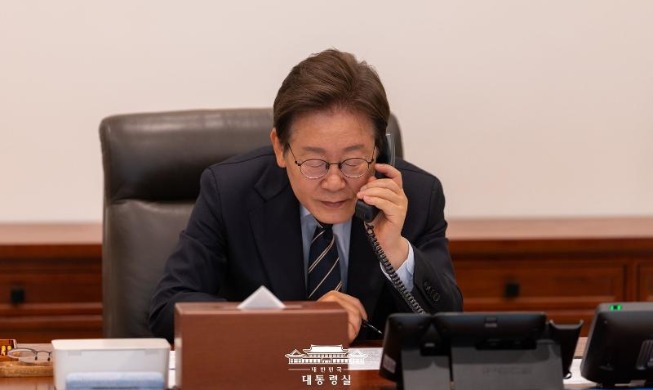South Korea and Russia reaffirmed their stance against North Korea's nuclear program and agreed to strengthen "strategic communication" amid tension over the planned deployment of an advanced U.S. anti-missile system to South Korea.
During a joint press conference following her summit with Russian President Vladimir Putin, Park defended the plan to deploy a Terminal High Altitude Area Defense (THAAD) system on the Korean Peninsula, though she did not directly mention it.
"North Korea has threatened to carry out additional nuclear tests and launch a preemptive nuclear strike while advancing its nuclear capabilities. For South Korea which lies within minutes' distance (of North Korea's possible strikes), it is a matter of life or death," she stressed at the meeting with reporters in Russia's Far East port city of Vladivostok.
The summit, the fourth between them, was held on the sidelines of the Eastern Economic Forum (EEF), a venue to discuss regional cooperation in developing Russia's resource-rich Far East.

"A responsible government cannot help but craft a way to safeguard the safety the nation and lives of its people," she added.
Her remarks came as Moscow remains opposed to the plan by Seoul and Washington to deploy a THAAD battery, a core element of America's global missile defense program, to the peninsula by end-2017.
Moscow, along with Beijing, expressed concerns that the deployment would escalate regional military tensions and undermine its strategic security interests. But Seoul has made clear that THAAD is an inevitable, self-defense measure to counter Pyongyang's growing nuclear and missile threats.
During her opening remarks, the president pointed to trust as the "most crucial" element in the development of relations with Russia.
"The South Korea-Russia relationship has, thus far, undergone various changes, but the importance of the relationship with each other remains unchanged," Park said during a summit with her Russian counterpart.
"I believe for the relationship to be well-managed and developed, trust is the most crucial thing, and to accumulate trust, I believe, close communication between us is of great importance," she added.
Putin highlighted the importance of bilateral economic cooperation, saying South Korea is one of Russia's "outstanding" partners in the Asia-Pacific region.
"We have been pursuing comprehensive economic cooperation. We are cooperating in energy, agriculture and the manufacturing sector (among others)," Putin said. "We are delighted to have this direct contact between the leaders of the two countries."
Besides strategic relations, Seoul and Moscow agreed at the summit to seek a free trade agreement (FTA) between South Korea and the Russia-led Eurasian Economic Union (EAEU).
The two sides will begin government consultations as early as next month over issues related to official negotiations on the FTA between South Korea and the bloc consisting of Russia, Armenia, Belarus, Kazakhstan and Kyrgyzstan, Seoul's presidential office Cheong Wa Dae said.
"The two sides agreed to promptly proceed with follow-up measures needed for FTA negotiations after wrapping up the civilian feasibility study," Kang Seog-hoon, senior presidential secretary for economic affairs, said, referring to the study that the two sides have been conducting since December.
The EAEU, launched in January 2015, is a customs union. It has a combined population of 180 million with its gross domestic product reaching US$1.6 trillion.
Putin, meanwhile, said earlier in the day during a session of the EEF, that North Korea must stop its provocative behavior and respect U.N. Security Council (UNSC) resolutions banning its nuclear and missile tests.
He said that Russia has "various channels" with North Korea and will use such channels to help address the ongoing nuclear standoff with the North.
"Russia is against the proliferation of nuclear arms," he said.
By Yonhap News
During a joint press conference following her summit with Russian President Vladimir Putin, Park defended the plan to deploy a Terminal High Altitude Area Defense (THAAD) system on the Korean Peninsula, though she did not directly mention it.
"North Korea has threatened to carry out additional nuclear tests and launch a preemptive nuclear strike while advancing its nuclear capabilities. For South Korea which lies within minutes' distance (of North Korea's possible strikes), it is a matter of life or death," she stressed at the meeting with reporters in Russia's Far East port city of Vladivostok.
The summit, the fourth between them, was held on the sidelines of the Eastern Economic Forum (EEF), a venue to discuss regional cooperation in developing Russia's resource-rich Far East.

President Park Geun-hye talks with her Russian counterpart Vladimir Putin during their summit on the sidelines of the Eastern Economic Forum in Russia's Far East port city of Vladivostok on Sept. 3. (Photo: Cheong Wa Dae)
"A responsible government cannot help but craft a way to safeguard the safety the nation and lives of its people," she added.
Her remarks came as Moscow remains opposed to the plan by Seoul and Washington to deploy a THAAD battery, a core element of America's global missile defense program, to the peninsula by end-2017.
Moscow, along with Beijing, expressed concerns that the deployment would escalate regional military tensions and undermine its strategic security interests. But Seoul has made clear that THAAD is an inevitable, self-defense measure to counter Pyongyang's growing nuclear and missile threats.
During her opening remarks, the president pointed to trust as the "most crucial" element in the development of relations with Russia.
"The South Korea-Russia relationship has, thus far, undergone various changes, but the importance of the relationship with each other remains unchanged," Park said during a summit with her Russian counterpart.
"I believe for the relationship to be well-managed and developed, trust is the most crucial thing, and to accumulate trust, I believe, close communication between us is of great importance," she added.
Putin highlighted the importance of bilateral economic cooperation, saying South Korea is one of Russia's "outstanding" partners in the Asia-Pacific region.
"We have been pursuing comprehensive economic cooperation. We are cooperating in energy, agriculture and the manufacturing sector (among others)," Putin said. "We are delighted to have this direct contact between the leaders of the two countries."
Besides strategic relations, Seoul and Moscow agreed at the summit to seek a free trade agreement (FTA) between South Korea and the Russia-led Eurasian Economic Union (EAEU).
The two sides will begin government consultations as early as next month over issues related to official negotiations on the FTA between South Korea and the bloc consisting of Russia, Armenia, Belarus, Kazakhstan and Kyrgyzstan, Seoul's presidential office Cheong Wa Dae said.
"The two sides agreed to promptly proceed with follow-up measures needed for FTA negotiations after wrapping up the civilian feasibility study," Kang Seog-hoon, senior presidential secretary for economic affairs, said, referring to the study that the two sides have been conducting since December.
The EAEU, launched in January 2015, is a customs union. It has a combined population of 180 million with its gross domestic product reaching US$1.6 trillion.
Putin, meanwhile, said earlier in the day during a session of the EEF, that North Korea must stop its provocative behavior and respect U.N. Security Council (UNSC) resolutions banning its nuclear and missile tests.
He said that Russia has "various channels" with North Korea and will use such channels to help address the ongoing nuclear standoff with the North.
"Russia is against the proliferation of nuclear arms," he said.
By Yonhap News
